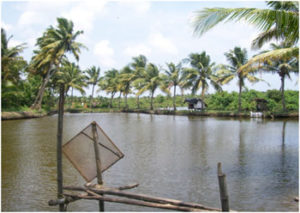
भारतीय जैविक एक्वाकल्चर परियोजना (आईओएपी)
जैविक जलकृषि दीर्घकालिक पारिस्थितिक और पर्यावरणीय रूप से ध्वनि प्रथाओं के आधार पर चिरस्थायी कल्चर प्रथाओं की एक विधि है । पिछले कुछ वर्षों में, पूरे विश्व में पर्यावरण जागरूकता बढ़ी है और जैविक उत्पादों की खपत के लिए उपभोक्ताओं की संख्या में वृद्धि हो रही है। जैविक जलकृषि के सामान्य सिद्धांत स्वस्थ, रोग मुक्त प्राकृतिक समुद्री खाद्य का उत्पादन करना है, बिना किसी एंटीबायोटिक, हार्मोन, रसायन आदि के उपयोग के और साथ ही पर्यावरण को सभी प्रतिकूल परिस्थितियों से बचाना है । स्वास्थ्य और पर्यावरण की चिंता के चलते वैश्विक बाजार में जैविक उत्पादों की मांग बढ़ रही है। जैविक जलकृषि अनिवार्य रूप से हानिकारक रसायनों और एंटीबायोटिक दवाओं के समग्र जोखिम को कम करके उपभोक्ताओं के स्वास्थ्य की रक्षा करता है। यह एक चीरस्थायी और पर्यावरण के अनुकूल तरीके से उत्पादन की एक स्वीकृत प्रणाली है।
Considering the growing market for organic products, the Marine Product Export Development Authority (MPEDA) has identified organic aquaculture as one of the potential thrust areas for development. In order to implement the programme, MPEDA initiated the India Organic Aquaculture Project (IOAP) during 2007, with the support of the Swiss Import Promotion Programme (SIPPO), Switzerland. The IOAP project was successful in developing certified stake holders such as (1) certified organic shrimp/scampi hatchery (2) certified organic feed mill (3) certified organic shrimp / scampi farm and (4) certified organic seafood processors. During the first phase of IOAP, the certified hatchery for both scampi and shrimp, feed mill for the production of organic feed organic processor have been established. It is a proud achievement of the IOAP that the organic scampi farmers from Kuttanad (Kerala), were the first producers of organic scampi in the World (2008).
National Programme for Organic Production (NPOP)
The European Union (EU) has made it mandatory for organic aquaculture products imported in to its member countries to follow the EU Standards from July, 2009. Therefore, framing country standards would be a more viable option, to equate the same with EU standards. In this connection, the National Standards for Organic Aquaculture are being finalized by National Programme for Organic Production (NPOP) under Government of India in consultation with various organizations.
The organic standards for aquaculture products are mainly prescribed by certifying agencies from the private sector. However, the higher cost of certification appears to be one of the major constrains for farmers to commence immediate development of the programmes. In this regard, the Agricultural and Processed Food Products Export Development Authority (APEDA) has taken steps to evolve National Standards for Organic Aquaculture Products in India.